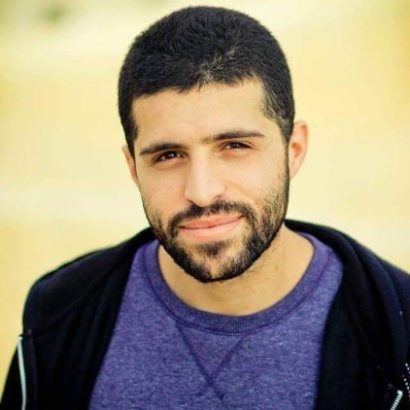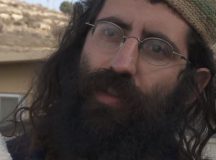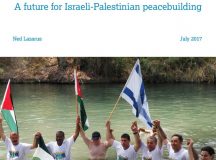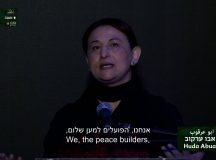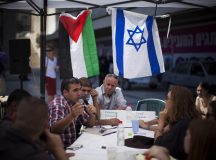Noor A’wad joined Roots, a Palestinian-Jewish peacebuilding organisation, in 2016 after meeting Rabbi Hanan Schlesinger and Ali Abu Awwad in 2016. He organises joint Palestinian-Israeli activities and speaks to visiting groups about his personal experiences. He lives in Bethlehem. Joshua A. Brook is an attorney in private practice in New York City. He served as an aide to the late US Senator Daniel Patrick Moynihan.
Joshua A. Brook: How would you describe the philosophy of Roots and why does it appeal to you? Why do you think it’s the right way forward for your people?
Noor A’wad: Our approach to peace is, yes, to promote the common humanity of Israelis and Palestinians. But the philosophy of Roots is that peace can be achieved with our identities being fully recognised. We need to bring to the table the fullness of both sides’ identities. This is unlike the approach of most of the peace organisations and people who are working in the peacebuilding field. Many believe that the power of identity is so strong and divisive, that we should try to reduce its power and focus on what brings us together which is our common humanity. At Roots we respect that approach, but we believe that although our identity is the source of the conflict, it could at the same time be the source of peace.
JB: One of the challenges is that, to a certain extent, each side’s identity is built on the negation of the other’s identity.
NA: Yes, I agree.
JB: How do you overcome that obstacle?
NA: One of the first and most important things is education. Educating yourself about the other side’s identity: not how you see them, but how do they define themselves. Basically, let the other side explain to you their identity rather than you trying to tell them who they are. Let them tell you who they are. That’s not an easy process to go through, but when you do it can reshape your identity. At Roots we create what I would call an inclusive narrative that includes both sides identities and it’s not based on exclusivity. Then you no longer feel that your identity is only strong when it’s based on the denial of the other’s identity.
People have to feel secure enough in their identity that they are able to hear the other side, and to recognise and see the other side’s identity. One thing is to meet someone on the other side that sees you, that recognises you. That’s what happened to me six years ago when I met [Roots co-founder] Rabbi Hanan [Schlesinger] for the first time – hearing him talking about my identity and my people with such recognition, while at the same time talking about his people and his identity. That recognition and empathy are what allowed me to put myself into this process of understanding and accepting the other side’s narrative, the other side’s truth, and the other side’s legitimacy.
JB: Does Roots include secular Israelis and secular Palestinians or is it primarily a dialogue between religious people on both sides?
NA: Roots includes secular Israelis and secular Palestinians. I define myself as secular. I know there are a good number of people who are at Roots who don’t think of themselves as ‘religious’ or ‘secular’. Roots is a grassroots initiative that brings together Israelis and Palestinians of all backgrounds.
JB: Can you point to concrete results that Roots has achieved so far? Or do you feel Roots is laying the groundwork for the future?
NA: We are laying the groundwork for a better future, definitely, but also impacting the present. We have our flagship centre which runs more than twenty activities: interfaith dialogue, educational programs, person-to-person, etc. And we have programs that are more focused on activism. The centre is growing and we are reaching more people.
Today we are building four other centres around Israel-Palestine. We don’t yet have the physical centres but we have acquired land. So we are scaling up the work, reaching more people, creating more impact. It’s a gradual process. But after eight years, I can definitely see practical results that we have achieved.
JB: On your recent speaking tour in the UK with Rabbi Schlesinger, you faced protests by pro-Palestinian activists. How did it feel to be denounced in that way, and what is your response to their accusation that you are, in a sense, normalising the occupation and legitimising the oppression of your own people?
NA: Actually just to clarify, the pressure and the protest came mostly from both pro-Palestinian voices and left-wing Jewish organisations. I said then and I say now: People need to listen to the message of Roots before assuming what our message is. I don’t think that by listening they are going to cause any harm or give up on what they see as their responsibilities. When they listen deeply, they will realise that we are allies. Then these people will not be against the work that we are doing.
I tried to speak to some of these protesters who are against Roots. I didn’t have enough time, and I didn’t have the right connections to reach out to all those people, but we succeeded in one place in the UK to meet with the pro-Palestine group. We sat in a room and talked honestly about the work we are doing. They asked us tough questions. We had a good meeting and a lot of misunderstandings were clarified.
But at the end of the day, we are talking about dialogue. We are talking about opening up, and hearing both sides — not to create any justification for the current injustices that we live here, under the occupation, but actually as a way to put an end to this occupation, to put an end to the conflict. To me, the work we are doing at Roots is another means of resistance — resisting the occupation in a way that talks about the future for both people, for both sides, not only for one side. Our message resonates with people who are pro-solution, not just the pro-Israel or pro-Palestine people, but people who are pro-solution. This is what we are all about.
JB: You’ve been involved with Roots for six years. From your actual conversations with the other side, what surprised you the most about Jewish identity, Israeli identity, and Zionist identity?
NA: In some ways it was the similarities between our two peoples. We both share the experience of exile, of being people who feel (or have felt) that they are not in their land, that they are in limbo, and that part of their culture, their heritage was lost in this exile, from not being physically on the land.
That’s what I feel myself as a descendant of a Palestinian refugee. We talk about losing our land in 1948, and what happened to us then, and how we became refugees living in the diaspora. That’s something that really resonates with me. That’s the language that I grew up with, that’s the experience I grew up with.
Also, being a secular Palestinian, I was always convinced that it’s the Israeli side who wants to make this a conflict over religion and not over national rights and politics. But I saw people connected to their religion who were still open to respect other peoples’ connection to their religion, and to respect their beliefs. That was also something surprising for me because, until then meeting religious people on both sides for me, was usually a negative experience in the sense that they were often not willing to listen or respect differences. They did not embrace pluralism. But at Roots, I saw something different. I’ve met, and I work with, and I became friends with religious people who respect differences and people with different backgrounds.
JB: What is the biggest thing that the Jews / Zionists / Israelis don’t understand about Palestinians and vice versa?
NA: I think there are many things. Fear is definitely a major thing. In your first meetings with ‘the enemy’ you experience fear — we are each afraid of the other side. This is something that the other side has a hard time understanding. We can’t understand how they are afraid of us, and they can’t understand how we are afraid of them.
One common misunderstanding I find among Jews is their belief that the Palestinians are just generic Arabs. They just see the Arabs as a whole, and assume that Palestinians get along with the rest of the Arab nations and there are no differences — like we are the same people. But in reality, of course, there are differences. There is also conflict with other Arab nations.
Of course, there is this desire that we have, there is this sense of unity with other Arab people, but that doesn’t mean that we don’t have differences. The Jordanian people are not exactly the same as the Lebanese people, and so on. There are important differences.
JB: Over six years of dialogue, what was the most moving encounter? What encounter was the most frustrating?
NA: Without exaggeration, I think that almost every encounter and every meeting at Roots was really very moving. And inspiring. Each makes you think on a very deep level about your identity, about the other side’s identity, about the stories that we tell ourselves, the stories we grew up with, the connections that we have.
Activism is particularly inspiring. We have the pre-military academies: We bring Israeli youth who are on a gap year before they join the IDF to Roots. They listen to our presentation, given by a Palestinian and an Israeli. For 99 per cent of them, it’s their first time ever hearing a Palestinian story! And in a few months they will be serving in the West Bank checkpoints, seeing Palestinians as enemies.
And we had many testimonies coming to us that, because of these encounters, because of speaking to them, how it changed their life and how it affected their service in the West Bank and their treatment of the Palestinian people. So when I hear these stories of an Israeli standing up for Palestinian rights, doing something to protect Palestinian rights, that’s an inspiring moment.
The difficult moment is when violence happens, and I see that the army or the Israeli authorities are putting my people under oppressive circumstances, and Jewish participants at Roots offer justifications for what the Army or government is doing. They are just not able to see the injustices that we are experiencing. And they relate to it in a very simple way by trying to find justification for what’s happening, and refusing to admit that their side is committing injustices against my side. This closed-ness is frustrating.
But when violence happens, I mostly experience something else. Something different from the frustration I described. I actually experience trust-building because my Israeli partners reassure me by saying something or doing something — speaking up to these injustices, and acknowledging our suffering. That increases the trust inside me in my partners.
JB: Do you see any prospects for a mass nonviolent movement by Palestinians, like the one that Gandhi led in India?
NA: I think there is the potential for that. In my work at Roots over the past six years, I also have met a good number of Palestinian activists who are talking about the importance of non-violence, the importance of mobilising the society when it comes to resisting the occupation and trying to make the change.
There are two main challenges: First, the leadership that talks about non-violence are not being empowered enough to lead the people. And second, the structural violence that we are living under makes it difficult for the people to see and to understand how non-violence can bring change.
Many Palestinians convinces themselves that we are living in this situation because the other side is more powerful than us and so we can truly resist it by violence They think that’s when the change will happen. Many people don’t understand because they haven’t seen an example of creative, non-violent ways of resistance that can actually create pressure and create the change we need without using violence.
So yes, I believe there is a potential for non-violent action. We have to talk about it today, because people are desperate. You can feel the sense of despair. We are in limbo. The two-state solution failed, the Israeli government is more right-wing, the Palestinian leadership is weaker than before, and divided, and it doesn’t seem like for an average person that there is light at the end of the tunnel. So talking about non-violence now, and talking about a mass movement is very important. The Palestinians who are joining Roots are trying to change the situation in nonviolent ways.
JB: Do you think a one-state solution is possible? Is the ultimate goal of this inter-communal dialogue to find a way to live together, or rather to lay the groundwork for a separation? Or is even asking that question at this point too speculative?
NA: Roots is not about just trying to create coexistence with settlers who are living in the West Bank. It’s not about that. It’s also not necessarily about creating a one-state solution. We don’t have a specific solution that we point to and say: ‘This is the solution, this is what it will be.’ We have a political vision. We say that we envision a new social and political reality that respects both people’s connection to the entire land, and will allow both people to live in freedom and dignity.
Now to bring this vision into practice, members of Roots look at several solutions, actually. Perhaps the most appealing, and the closest practical proposal to what Roots is talking about, is a confederation between two states. What do I mean? I mean that, yes, we need to have two states because at the end of the day, there needs to be a Palestinian State, and there needs to be an Israeli state for the fulfillment of both sides’ national identities. But each having a nation-state is not enough because we also recognise that there is a strong connection between both peoples and the entire land. So, how do you acknowledge that? There is a plan called Two States, One Homeland, which proposes a confederation similar to the European Union: Israeli and Palestinian States side by side but with open borders, freedom of movement and freedom of residency. Israelis and Palestinians can live wherever they want without having to change their citizenship, they vote in their nation and state elections. Palestinians will vote in Palestinian elections; Israelis will vote in Israeli elections; both States will be open and connected at the levels of economy, and security. When it comes to Jerusalem, you can create a reality in which Jerusalem is truly a one unified or united city with equality and equal access for both sides. This solution is, as I say, called Two States, One Homeland proposed by an initiative called A Land For All. This is a solution that I favour and is very close to what Roots is envisioning.
But we are saying that in order to get there, we have to create the strongest ground for any solution, i.e. people-to-people work that leads to mutual recognition. Because without that recognition and acceptance, it’s really hard to have a solution. A political agreement between politicians is not enough if you don’t have the support of both people.
JB: How do you define Zionism?
NA: Before I tell you how I define it, I will tell you how my people define Zionism. My people understand Zionism as a European ideological movement that convinced the Jews in Europe in the 19th century that they should come to the land of Palestine and settle it based on religious claims. And therefore the Zionist movement is nothing but a colonial movement that used religion and history to colonise the land of Palestine and to bring in a foreign population to build settlements and to colonise and occupy our land.
My people think about Zionism like this, not just because the Jews came from Europe, but also because the experience of the Palestinian people affirmed this understanding of Zionism. In 1948, we lost the land. The Israelis actually took over the land of Palestine, they changed the names of cities and streets and roads, and they destroyed many villages. So the experience of Palestinians after 1948 confirms that this was the main goal of Zionism: To erase the Palestinian people from their land, and to replace them with colonial people, people who are not from here.
Now, this is the way I have come to understand Zionism in my experience at Roots: ‘Zionism’ is another way of saying ‘Jewish nationalism’. Judaism is not only a religion. The Jews see themselves as a people, as a collective with a history and connection to this land, to the land of Israel, the land of Palestine. Jewish nationalism is not actually a new idea. It’s old; it exists in history, this idea of having Jewish sovereignty in this land. Zionism only revived an idea that existed hundreds and thousands of years ago and somehow succeeded in persuading part of the Jewish people to see themselves as being in exile, and to come back to their historic homeland and create their own state.
One more thing I want to add: To accept this understanding, I had also to differentiate between identity and how this identity is being practiced. Even though I do believe that the Jewish people have the connection and the right to be on the land, I can think critically think about how that was put into practice. The way Zionism achieved the return of the Jewish people, creating the state of Israel, and is today creating and building more settlements in the West Bank, was done following colonial methods. It was done in a way that created injustice for my people. We have to differentiate between identity, and between the way this identity is being practiced.
JB: I have one last very, very important question: What is the best falafel place in Bethlehem?
NA: There are two: Afteem and Abu Aladas. I will take you to one of them.

